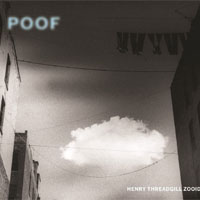Henry Threadgill Zooid • Poof
 ulitzer-winning composer
Henry Threadgill has always been a contrarian, going back to the 1970s and the trio Air,
the rare saxophone/bass/drums unit that wasn’t about power blowing but interlocking
parts -- an avantish band that also played Scott Joplin rags. Threadgill often looks
forward and back. His ongoing quintet Zooid’s beat-pumping tuba, spontaneous
counterpoint and fluid improvising within stylistic parameters might suggest an Old New
Orleans parade band, but the sound is something else. Zooid’s current incarnation has
drums, cello, (lightly amplified) acoustic guitar, Jose Davila’s tuba or trombone,
and Threadgill’s alto sax and flutes: a limber chamber group with jazz and classical
music in its family tree. ulitzer-winning composer
Henry Threadgill has always been a contrarian, going back to the 1970s and the trio Air,
the rare saxophone/bass/drums unit that wasn’t about power blowing but interlocking
parts -- an avantish band that also played Scott Joplin rags. Threadgill often looks
forward and back. His ongoing quintet Zooid’s beat-pumping tuba, spontaneous
counterpoint and fluid improvising within stylistic parameters might suggest an Old New
Orleans parade band, but the sound is something else. Zooid’s current incarnation has
drums, cello, (lightly amplified) acoustic guitar, Jose Davila’s tuba or trombone,
and Threadgill’s alto sax and flutes: a limber chamber group with jazz and classical
music in its family tree.
For Zooid, Threadgill developed a new way of organizing material that bypasses major and minor harmonies, and the prefab licks musicians might play over them. A typical piece has several sections which Threadgill may elect to play in any order. For each short or longer segment, each musician is assigned a few (three or more) notes to play, a little pitch set -- though Threadgill thinks in terms of the intervals between those notes, the spaces that separate them. What interests him is the getting from one to the next, an art of constant motion, swinging like a trapeze. Juggling those intervals can lead any player to other pitch sets, keeping the collective improvising in flux. Yet for all the complexities it sounds inviting: transparent and jittery, surging ahead without a fixed beat, or European harmony’s goal orientation. There is plenty of soloing (and improvised accompaniment), where the players mind those interval sets but aren’t limited to them. Early on in “Come and Go,” a sporadic dialogue between Liberty Ellman’s guitar and Threadgill’s alto gives way to a typically terse and scalding Threadgill alto solo -- you might hear field hollers way behind it -- and then a Christopher Hoffman cello improvisation in a similarly spare vein: Those little pitch sets often lead to short, aphoristic improvised phrases. The actual melody, all 17 seconds of it, is only stated at the end, a familiar new-jazz ploy, as if the composition arose from the improvising, not vice versa. “Poof on the Street Called Straight” is one of those slow Threadgill pieces critics used to call dirges (but the composer called love songs). He delivers this alto melody in three installments, broken up by guitar and cello solos. (A rare bit of conventional resolution: the first note of Ellman’s guitar solo resolves Threadgill’s previous phrase.) The especially lively closer “Now and Then” might have been the leadoff, with the spikiest, catchiest head, save that Threadgill only plays the melody: a four-second teaser at the top, the full 27-second version at the end. Zooid knows his language so well, they can carry on without him. On a pair of pieces with Threadgill on flute or bass flute, and plucked cello in the bass role, Zooid’s chamber side comes to the fore. Like other African American composers who emerged from Chicago’s Association for the Advancement of Creative Musicians (AACM), Threadgill projects a new black classical music, using jazz tone colors, and (here) plenty of animating improvisation -- from Davila on garrulous trombone (“Beneath the Bottom”) and drummer Eliot Humberto Kavee (“Happenstance,” slow and out of tempo at the top, lightly swinging by the end). Things can get dense, but silence and thin textures are
part of the mix, and there’s just enough reverb to let you appreciate the airier
moments -- to hear the space between the instruments as well as between the notes of a
single line. The five-piece program clocks in at 38 minutes, but given all that complexity
and concentrated playing, it feels like a full helping. |
